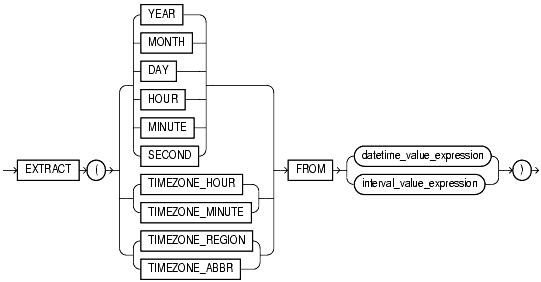| Oracle9i SQL Reference Release 2 (9.2) Part Number A96540-02 |
|
|
View PDF |
| Oracle9i SQL Reference Release 2 (9.2) Part Number A96540-02 |
|
|
View PDF |
extract_datetime::=

EXTRACT extracts and returns the value of a specified datetime field from a datetime or interval value expression. When you extract a TIMEZONE_REGION or TIMEZONE_ABBR (abbreviation), the value returned is a string containing the appropriate time zone name or abbreviation. When you extract any of the other values, the value returned is in the Gregorian calendar. When extracting from a datetime with a time zone value, the value returned is in UTC. For a listing of time zone names and their corresponding abbreviations, query the V$TIMEZONE_NAMES dynamic performance view.
Some combinations of datetime field and datetime or interval value expression result in ambiguity. In these cases, Oracle returns 'UNKNOWN' (see the examples that follow for additional information).
See Also:
|
The following example returns the year 1998.
SELECT EXTRACT(YEAR FROM DATE '1998-03-07') FROM DUAL; EXTRACT(YEARFROMDATE'1998-03-07') --------------------------------- 1998
The following example selects from the sample table hr.employees all employees who were hired after 1998:
SELECT last_name, employee_id, hire_date FROM employees WHERE EXTRACT(YEAR FROM TO_DATE(hire_date, 'DD-MON-RR')) > 1998 ORDER BY hire_date; LAST_NAME EMPLOYEE_ID HIRE_DATE ------------------------- ----------- --------- Landry 127 14-JAN-99 Lorentz 107 07-FEB-99 Cabrio 187 07-FEB-99 . . .
The following example results in ambiguity, so Oracle returns 'UNKNOWN':
SELECT EXTRACT(TIMEZONE_REGION FROM TIMESTAMP '1999-01-01 10:00:00 -08:00') FROM DUAL; EXTRACT(TIMEZONE_REGIONFROMTIMESTAMP'1999-01-0110:00:00-08:00') ---------------------------------------------------------------- UNKNOWN
The ambiguity arises because the time zone numerical offset is provided in the expression, and that numerical offset may map to more than one time zone region.